By Charlotte Harland, Assistant Headteacher, Hilbre High School
So, here we are: deep in Workshop 4 and trialling ways to make the Embedding Formative Assessment programme not just a programme but an adaptable programme that empowers staff and pushes people to move out of their comfort zones – not an easy task, I must say. I actually wonder whether any teacher can get to that ‘I now know exactly what I’m doing’ stage in EFA and I suppose in the true spirit of Dylan Wiliam, maybe we’re not supposed to – we’re just meant to get ‘better at it’. It’s a funny thing ‘hindsight’. If I had known what I know now, would I have done/planned/adapted anything differently when starting the journey of the EFA programme. Maybe, but then isn’t that what it’s all about? Trialling and adapting, using and throwing away, taking risks and it working out, taking risks and it not working out. I’ll stop talking cryptically and I’ll get to the point: as a leader of the EFA Programme, understanding why you are doing this is key to a successful launch and beginning. And of course, listening to your staff body along the way makes all the difference in those early months. Staff feedback can be taken from a number of people and places: through your TLC Leads, a passing on a corridor, question walls, staff voice and so on. You must get to know what is easy and what is hard. If you don’t address the hard things or the misconceptions of those early workshops and protocols, there is a risk that staff could switch off and not follow the programme to its true potential which means you’re working harder to get staff on board later on in the process. I am going to share with you how we as a school have organised and delivered the programme so far to ensure a successful beginning and future success. By no means are we perfect but hopefully I can shed some light in how we have moved towards a greater future in students’ learning and responsive teaching.
The Big Launch: One shot to sell – make it a good ‘un:
For me, this is the most important part when beginning the process. The launch is your time to excite the staff in front of you. In this presentation, we shared three concepts that we wanted staff to know and that were most important to us as a school when starting this journey (the WHY we were doing this):
- The opportunity to invest in ourselves as teachers and have the opportunity to develop in a non-threatening environment – this wasn’t going to be ‘done’ to staff, staff were going to be their own leaders of their CPD.
- The EFA Programme was not an ‘add on’. We very much linked the programme to our Teaching and Learning policy and demonstrated how this aligned with assessment and feedback within ‘The Hilbre Way’ non-negotiables.
- As part of the previous year’s quality assurance, assessing students’ progress in lessons was a development need. Ofsted had recognised that our SEND and disadvantaged cohort, although achieving better than in previous years, were progressing at different rates across subjects. This needed a whole school strategy that was going to transform teaching within the classroom.
In summary my advice is to show your staff the connections to your setting. The ‘why’ is so important and staff need to understand why this is something they need to engage with or even better, want to.
When introducing the ‘why’, keep your vision student-focused. If teachers believe this will benefit the learners in their classrooms, how can they argue against it?
Example of the ‘why’: Slide taken from the launch presentation.
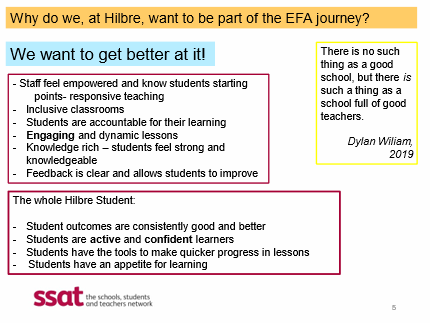
Tracking Techniques that staff have selected:
One of the things we wanted to monitor was the specific techniques that were being selected by staff and what classes these were being trialled with. Of course, these are tracked on the Action Planning Sheets (top-tip: do these virtually and not on sheets of paper), however, this would take a lot of time going through each individual member. Although I’d love to take credit for this, our AHT of Assessment created a wonderful spreadsheet that allowed the TLC Leads to collate the techniques selected and add them to the spreadsheet as teachers left each workshop. This meant we had a quick overview of all strategies being used across every year group. If there was a year group that felt under-prioritised, we could ask staff to consider the year group in the next workshop. This has helped with ensuring there is a wide breadth of techniques being trialled across all year groups.
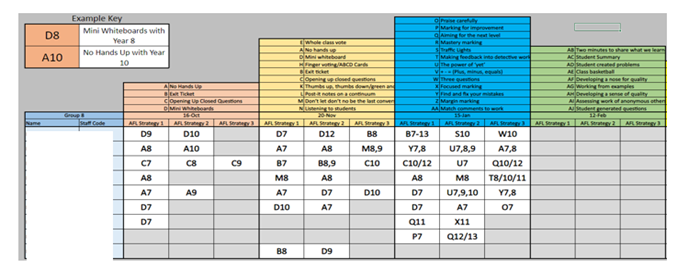
Don’t be scared to adapt and plan for the needs of your staff:
At the end of Workshop 2, I asked for feedback from the TLC Leads – are you seeing staff use their Peer Feedback sheets when reflecting on the use of a technique in your workshops? It turns out not all teachers were using the sheet. Why? Because they couldn’t be bothered? Highly unlikely. If there is one thing I have learned about teaching, you can’t get far not being bothered. There is only really one explanation if a member of staff is not following the process that they should be. They don’t understand it. It’s as simple as that. There is a lack of communication for whatever reason and if you want it to change, it has to be addressed. I would also like to add here that it took one question from a member of staff that made me realise, if this person doesn’t get it, plenty more will be in the same boat. How did we address this? We looked at the Peer Feedback sheet and broke it down into steps. Where evidence was to be collected by the observer, the section where the teacher had to inform the observer of what to collect was often too broad. Consider the experience of your teachers. Newly qualified teachers may find it much harder to give feedback or tell an observer exactly what to look for. They may need more guidance on what to focus on from their chosen technique. This is where you can adapt. See below the CPD slides we created to support staff in breaking down the Peer Feedback Sheet. Giving staff clear focus when deciding what evidence to collate, made it easier to come up with ideas. For further consistency, I also spoke over the slides to ensure the CPD was consistent with all staff. See below the slides for the Peer Feedback sheet:
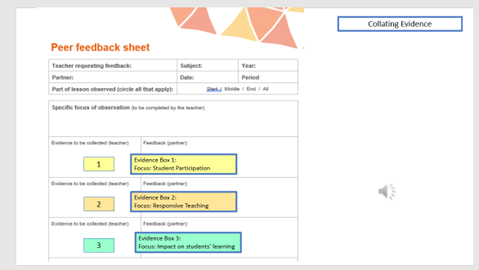
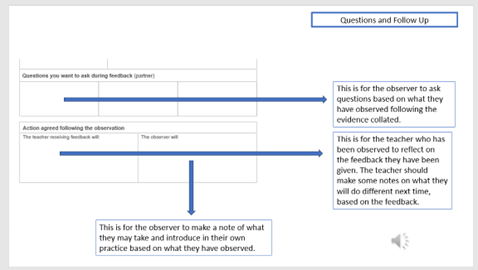
Giving extra support in a quick fix:
Very early on in Workshop 1, one of our TLC Leads created a support document called, Take Five. This is a sheet that has five top tips in how to use some of the AFL techniques in the classroom. The steps give staff the opportunity to ‘think outside of the box’ and give further ideas in how the techniques could be used. This resource has continued throughout each workshop and staff have fed back that they like the tool as another layer of support in how and when to use the techniques. Right from the beginning, staff asked for exemplar and extra support in the usage of techniques. Remember, staff are not the experts. Through trialling and practice, staff will get better. A question to always ask yourself as the leader of this programme: do all staff know how to trail the techniques to their best potential? Find ways of giving extra opportunities to share good practice and remember to consider the range of experience in your staff body. See below the example of a Take Five support sheet:
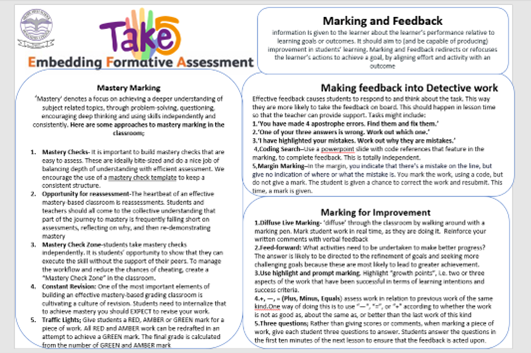
Hopefully, these reflections and tips give an overview of how to start the EFA Programme positively and creatively. We are very much enjoying the process and feel we get stronger in the delivery as each workshop unfolds.
There are more exciting developments ahead for Hilbre High School. We very much want to film some lessons and share these with staff to bring about discussion of AFL techniques used when watching live practice. We are also keen to develop the usage of techniques trialled already and how we can get better at them.
If there is one last thing to leave you with it’s to raise the profile of EFA and celebrate it as much as you can. Use briefings, newsletters, your website, parent mails, mini reminders on whole school platforms and leadership meetings to get staff and stakeholders talking about it! Highlight staff members who have done well or have challenged themselves.
And lastly, make sure the SLT team are doing the process too. Don’t let them escape the formative assessment craze! When everybody contributes and is involved, it feels meaningful and brings about the whole school change. And anyway, who doesn’t want a biscuit and an hour of talking about their development in the teacher world….enjoy!
Find out more about Embedding Formative Assessment
A two-year professional development programme for all schools and colleges that has been independently proven to increase student achievement.

